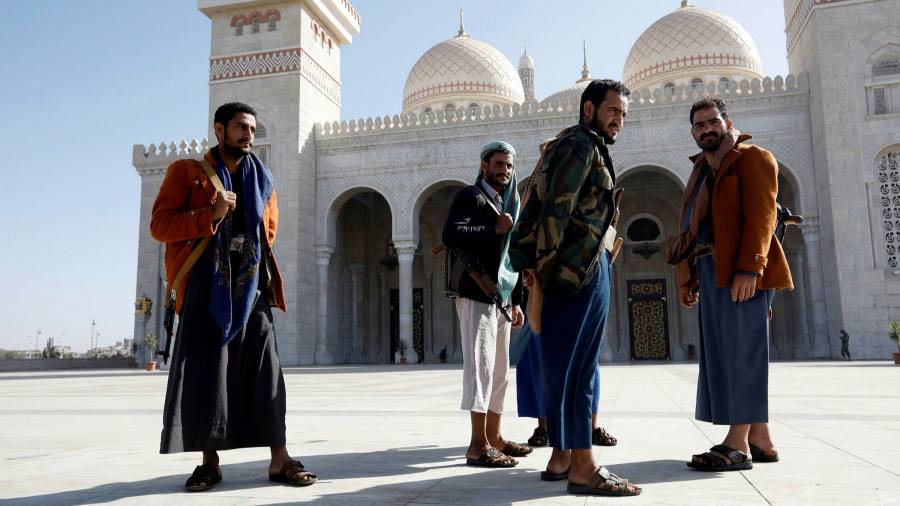[ad_1]
No sooner had the Biden administration reversed Donald Trump’s policies on Yemen in an effort to bring the country’s six-year war to a close, than some of the bloodiest battles of the conflict erupted.
The escalation of fighting this year — which has seen Iran-aligned Houthi rebels launch a long-planned offensive to seize Marib, the only northern province outside their control, and increase attacks on Saudi Arabia — underlines the fraught task facing Washington.
US president Joe Biden has made ending the war one of his top foreign policy priorities. What began as a civil war morphed into a proxy battle when a Saudi-led and US-backed Arab coalition intervened against the Houthis in 2015. The UN has described the situation in Yemen as the world’s worst man-made humanitarian crisis.
But analysts say Washington’s decision to revoke a Trump-era designation of the Houthis as a terrorist organisation and pressure Riyadh to halt its six-year intervention in the conflict has only emboldened the rebels.
“The designation of the Houthis was stupid and harmful, but removing it without any conditions is as stupid, because for the first time you had leverage over the group,†said Farea al-Muslimi, a Yemeni analyst at the Sana’a Centre for Strategic Studies. “As much as you blame the Republicans for giving the Saudis a free hand, you can pretty much say the same about the Democrats with the Houthis.â€
This year alone, the Houthis, a battle-hardened Islamist movement, have fired more than 50 drones and missiles into the kingdom, targeting airports, cities and oil infrastructure.
While Washington has put pressure on Riyadh to end the conflict — and Riyadh would like to extricate itself — it has far fewer levers to cajole the Houthis to the negotiating table.
Washington lifted the designation on the Houthis amid warnings that labelling the rebels terrorists would trigger the world’s worst famine in decades. Up to 80 per cent of Yemen’s population live in areas under Houthi control, and the concern was that traders would not import goods to those regions for fear of falling foul of US sanctions.
A Western diplomat insisted removing the designation was “necessary and fundamental†but acknowledged the Houthis had been emboldened. “It’s been an irritant to the new administration, they didn’t want to do this to help the Houthis,†he said.
Diplomats are still hoping that intensified US diplomacy, led by Tim Lenderking, Biden’s Yemen envoy, can create a breakthrough. Lenderking has already met Houthi officials in Oman and held talks with Saudi and Yemeni leaders, according to diplomats and officials.

Riyadh has sought to exit the war for more than a year as missile and drone strikes underscored the vulnerability of the kingdom’s infrastructure, while civilian casualties in Yemen resulting from Saudi air strikes have drawn widespread criticism.
But Saudi Arabia “never quite pursued [an exit] vigorouslyâ€, said the diplomat. He added that the Biden administration’s pressure on Riyadh, including freezing arms sales to the kingdom, had injected new momentum.
Both the US and Riyadh back a UN-mediated plan that focuses on a cessation of hostilities, the Saudi-led coalition lifting its blockade on Sana’a airport and Hodeida port, and political dialogue between Yemeni parties, officials said. “If they get a ceasefire, then they continue on what Lenderking has called a dual-track approach,†a US official said, referring to political talks and humanitarian relief.
But while insisting they want a diplomatic solution, Saudi officials are concerned about the Houthis retaining control over the populous north and Iranian influence in Riyadh’s backyard.
“We have continuously talked to the Houthis. But alongside those discussions, we need pressure, because whenever someone lifts the pedal, that emboldens those within their leadership who don’t want to find a negotiated solution,†said a senior Saudi official. “The Houthis must have a role and a say in Yemen in the future, but as a minority they can’t expect to dictate to the majority of the population.â€
Western diplomats hope Saudi Arabia’s arch rival, Iran, could help convince the Houthis to halt the fighting at a time the Biden administration is looking to negotiate with Tehran over the US rejoining the 2015 nuclear deal that Trump abandoned.
Martin Griffiths, the UN envoy for Yemen, visited Tehran for talks for the first time last month, and diplomats are banking on the fact that Iran’s links to the Houthis are less strategic than its support to proxies in Iraq, Lebanon and Syria.
But analysts question the extent of Iran’s influence and whether the Houthis will seriously engage, given their strength on the ground as they battle a weak and fractious Yemeni government.
“The problem is, the Houthis don’t really want to end the war, they don’t have to. They control 75 per cent of the Yemeni population and the other side [the Yemeni government] is totally fragmented,†Muslimi said.
If the Marib offensive is successful, the rebels have “effectively†won the war for the north of Yemen, said Peter Salisbury, analyst at the International Crisis Group think-tank. Victory in Marib could also create more divisions in the Yemeni government, which would benefit the rebels if they advanced south.
“The Houthis see this as a war with Saudi Arabia. They want it to be ended by a deal with the Saudis that makes it clear they represent the state,†Salisbury said. “It’s very hard to see how you find a middle ground everyone can accept given the power dynamic on the ground.†An official in the Yemeni government said it would be a “disaster†if the Houthis seized Marib. “If that happens then no one will talk any more about peace,†he said.
[ad_2]
Source link






